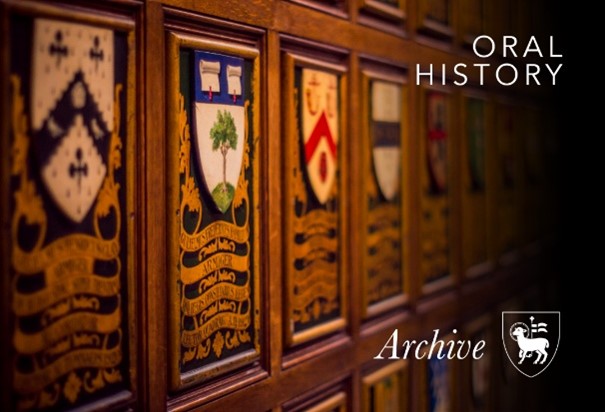In 2023, the Archive & Collections Department launched an ongoing Oral History Project, with a particular focus on seeking the participation of members of the Inn from historically marginalised and underrepresented groups, to ensure that these stories, experiences and insights are heard, recorded, and passed on as part of the Inn’s history.

What is Oral History?
Oral history is the act of recording conversations, often in the form of informal interviews, which provide the personal record of the interviewee’s memories, experiences and opinions, focusing on their lived experience.
The History of Oral History
In pre-literate societies, the spoken word was used to pass down stories and tradition, being the only form of ‘history’. However, it is important to note how many written historical sources are based on oral testimony. For example, in the 5th Century BC, the Greek historian Thucydides drew heavily on the accounts of eyewitnesses of the Peloponnesian Wars, ‘whose reports I have checked with as much thoroughness as possible’. Other examples of using oral testimony in written records include transcripts from court proceedings and newspaper accounts of events.
The origins of oral history in the form of an audio recording began with Allan Nevins, who recorded the memories of ‘persons significant in American life’ in 1948. In the UK, pioneering oral history work was begun by George Ewart Evans, who focused on collecting memories of life and work in Suffolk villages. Likewise, in Wales and Scotland, the beginnings of the oral history movement started with a broad focus on rural culture and history.
With technological advances, recording devices became widely available and accessible, leading to more oral history projects being run by institutions, historians and archivists, collecting a wide-ranging and diverse oral history of the country.
Why Do We Do Oral History?
Oral histories are a helpful addition to the archive as they are a valuable source of knowledge about the past, which can ‘fill the gaps’ in historical records where there is a lack of other sorts of evidence. They are instrumental in capturing the memories and stories of groups who are often underrepresented in more formal records and histories.
An advantage of spoken words is that they allow one to convey one’s feelings and emotions with an immediacy and impact that a written word record cannot do. We gain a first-hand account of history with individual storytelling approaches.
Collecting Histories at the Middle Temple
The Archive & Collections Department’s oral history project is looking to collect a diverse range of histories at the Inn through a series of phases. Since the initiation of the project, we have seen the participation of LGBTQ+ members, disabled members, female Readers and Treasurers, and members of long-standing standing. As the project continues, further phases will seek to include more underrepresented groups and build a broader and deeper understanding of the history of the Inn from the perspective of its members.
Alongside collecting a more diverse history of the Inn, we are also looking to add context and emotional insight into our understanding of social events which have occurred at the Inn over time. For example, while we have official programmes, menus and planning records for many dinners, royal visits and performances which have taken place at the Inn, we often lack a knowledge of some of the more ‘human’ elements of the event, such as what happened on the day, how the food tasted, and what people were wearing.
Future Uses of Oral Histories at Middle Temple
By their very nature, oral history recordings completed at Middle Temple are people’s memories and experiences, and therefore, to ensure confidentiality, unless the participant’s explicit agreement is given, the recording will be closed to public access (embargoed) for 100 years after the date of the recording, or after the death of the participant.
It is hoped that in years to come, the Oral Histories we have collected and will continue to collect can be made available in a variety of ways. Researchers might access recordings, which can be used in exhibitions and extracts shared online to engage our members with a more thorough and richer account of the Inn’s history.
If you are interested in participating in this initiative, please write to oralhistory@middletemple.org.uk with a few lines about you, your background and what your contribution to the project might be. Please do also get in touch if you have any further questions about the project.

Francesca qualified as an archivist at the University of Glasgow in 2019, joining the Inn’s Archive Department later that year as Project Archivist, progressing to Assistant Archivist in 2021. She works on a variety of different projects, including the preservation of the Inn’s digital records.

